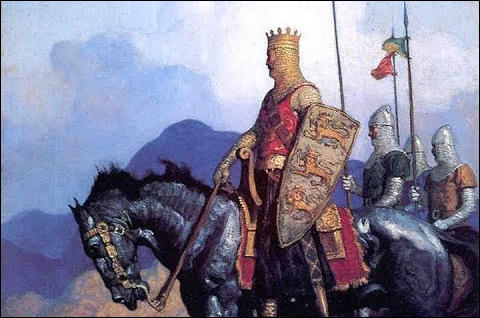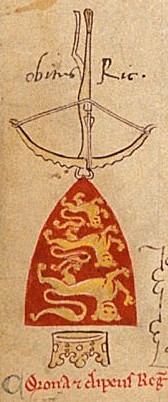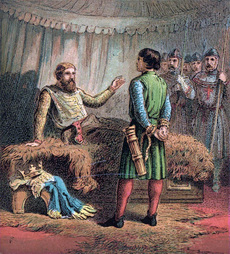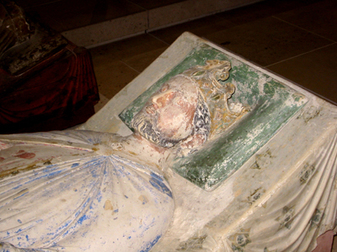Baldwin of Exeter the Archbishop of Canterbury reacted by replying
Instead of leaving his younger brother John in control of England in his absence he appointed as regents Hugh, Bishop of Durham and William de Mandeville who soon died and was replaced by William Longchamp. It comes a no surprise then, that John was not satisfied by this decision and attempted to overthrow Longchamp, John was more popular than Longchamp in London, and in October 1191 the city opened the gates to him while Longchamp was confined in the tower. John promised the city the right to govern itself in return for recognition as Richard's heir presumptive. Some were in support of John as Richard only spent six months of his reign in England and emptied the kingdom's coffers to pay for his crusade. According to William Stubbs in The Constitutional History of England
adventurous spirit, do not serve to cloak his entire want of sympathy, or even consideration, for his people. He was no Englishman, but it does not follow that he gave to Normandy, Anjou, or Aquitaine the love or care that he denied to his
kingdom. His ambition was that of a mere warrior: he would fight for anything whatever, but he would sell everything
that was worth fighting for.The glory that he sought was that of victory rather than conquest. ”
Although England was a major part of his territories Richard faced no major internal or external threats during his reign, it was his French territories where he felt that he was needed. He left England in the hands of various officials, including, at times his mother. This meant that Richard was far more concerned with his more extensive French lands and he either did not know or care that the people of England were being subjected to the greed of feudal barons, contemptuous sheriffs and as history puts it the ’wicked and cowardly John’.
John was no hero he was untrusting and he too was selfish but he took it upon himself to take control of a country that might have easily fallen into the hands of unscrupulous barons. Of course, that's another story.
Richard I's life is viewed by his exploits whist on crusade where a great piece of medieval PR by Richard de Templo, makes the king sound like some sort of superman.
escaped when his sword made contact with them; wherever he went his brandished sword cleared a wide path on all sides. Continuing his advance with untiring sword strokes, he cut down that unspeakable race as if he were reaping the harvest
with a sickle, so that the corpses of Turks he had killed covered the ground everywhere for the space of half a mile."
Richard's wound soon became gangrenous and he died on the 6th of April 1199.
One can picture the scene, a golden light shining through the castle window, the king in the arms of his mother, his blooded three lion tabard placed over a chair, he heroically gestures towards the door as his pardoned enemy walks away clutching a bag of gold. The last breath of a king drowned in the wailing of his mother.
what better way to reinforce the idea that Richard was the magnificent king his subjects always thought he was. My problem with this story is, how did anyone know exactly who fired that fatal crossbow bolt from out of the many armed men at ground level, the truth is of course, they probably did not. How Pierre Basile arrived at the kings beside goes unrecorded, but it is said that he was paid handsomely and sent on his way, only the very next day the poor man was flayed alive.
Richard may well have ordered the death of this unfortunate archer, a young man in the wrong place at the wrong time, if he did then it was an act of vengeance, after all Richard had made grand gestures before only to go back on them later, however I believe we should look to Richard's mother, the fiery strong willed Eleanor, his most ardent supporter, as the person who ordered this man death.
As was the norm Richard's heart was taken to Rouen and the rest of his body to Fontevraud Abbey in Anjou and while his mortal remains turned to dust his reputation as a handsome and mighty crusading king is as solid today as it was then.





 RSS Feed
RSS Feed
